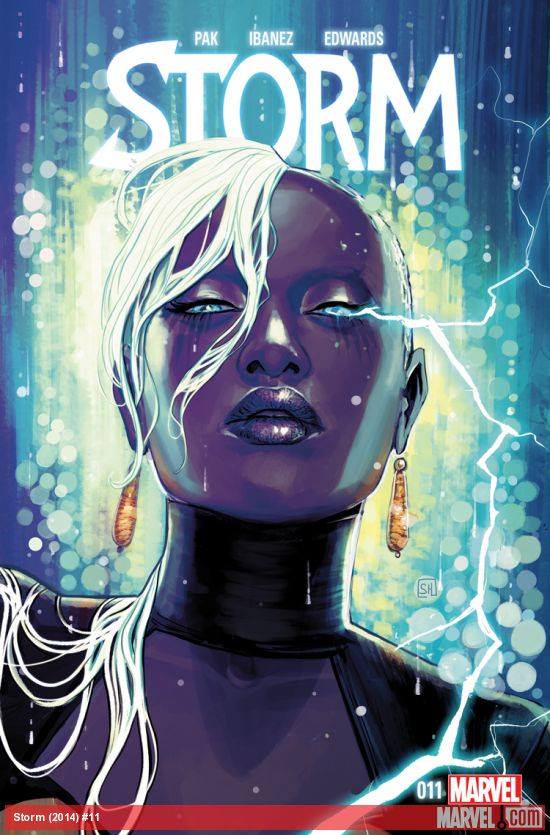Alexandra Shipp Got into an Argument on Social Media for Playing a Light-Skinned Storm
 I feel sorry for what Alexandra Shipp had to recently face on Twitter due to playing a light-skinned Storm in the X-Men live-action franchise. Colorism is definitely an issue in media. However, I do think that the entire situation could’ve been handled much better.
I feel sorry for what Alexandra Shipp had to recently face on Twitter due to playing a light-skinned Storm in the X-Men live-action franchise. Colorism is definitely an issue in media. However, I do think that the entire situation could’ve been handled much better.
I’m not an African-American woman. So, I can’t really talk about the colorism experienced by people in the black community. However, I’m a PoC myself and we do have our own brand of colorism over here in Pakistan which is what led me to talk about Alexandra Shipp’s situation.
Shipp was sent a tweet from a fan about a possible team-up between Storm and Thor due to the Disney/Fox acquisition. Of course, Shipp was excited about such a possibility. However, the entire thing took a very different turn when another person tweeted to her about Disney recasting the X-Men and that fans would finally get “a dark-skinned non-racially Ambiguous Storm like we deserve.”
Nope. Disney is re-casting the whole team, boo. Sorry. Dark Phoenix will be your last. We getting a dark skinned non-racially Ambiguous Storm like we deserve. pic.twitter.com/sOFlVhx7ZG
— Sara (@Saaaa_hot) December 14, 2017
Now, while these words talk about the colorism issue in media, they are also quite harsh. Of course, Shipp was upset and in her reply she talked about racism.
This. Right. Here. Pure hate. Its disgusting. My whole life I’ve had to defend my skin tone, like its controllable, like I’ve ever been treated white. Sorry, your racism doesn’t work on me. I’m a strong black woman & no one will EVER be able to take that from me not even a troll. https://t.co/Nl8HqoiDuf
— Alexandra Shipp (@AlexShipppp) December 14, 2017
This led to numerous people sharing their opinions and resulting in the discussion to escalate, with people saying that Shipp doesn’t understand the difference between racism and colorism.
Sis, darker skinned Black people wanting representation isn’t racism. Taking it to your mentions may be a bridge too far, but dismissing colorism and its negative effects isn’t cool either.
— Nina Perez (@AuthorNinaPerez) December 14, 2017
Actress Taylour Paige (Hit the Floor), who has two black parents, also chimed in.
Wow. Ok I’m bad with words. i admit that. But you, Queen, are an eloquent Goddess and are TOTALLY getting the point. Just wow. Well said 👏🏾👏🏾👏🏾 https://t.co/RY5XFyA9fC
— Alexandra Shipp (@AlexShipppp) December 15, 2017
While Storm’s lineage consists of an African mother and an African-American father, Halle Berry and Alexandra Shipp (both actresses with a white mother and African-American father) have played her on the big screen. This has led to Storm being lighter-skinned in the films.
As someone who isn’t American, I’m still able to see colorism issues when I consume Western media. There are still people out there who argue that Halle got her Oscar win and became a well-known black actress because she’s more palatable for the white audience. Furthermore, people argue that she, like other similar actresses of color (Shipp, Zendaya, etc.), are on our TV and movie screens due to having features that are more ‘white-friendly.’ On the other hand, darker-skinned actresses like Oscar-winner Lupita Nyong’o are still waiting for an opportunity to lead a film.
Now, I’m not ignoring the struggles that lighter-skinned actresses have to face to make a name for themselves in the industry. However, I do agree with ‘The Root’ about there being a level of privilege involved and the issue of colorism.
Coming to Pakistan, even here you can see media showcasing fair-skinned actresses for their beauty in films, television, modeling, etc. Furthermore, there are numerous advertisements talking about beauty products that can make your skin fairer to achieve a standard of ‘Western’ beauty.
As someone who falls under the fairer-spectrum, due to being half-Kashmiri from my mother’s side (a race known in history for their European looks), I have experienced life (both struggles and privilege) a bit differently than my darker skinned siblings, who are also half-Kashmiri but you know, genetics.
Some examples include:
- Being called “Wah! Tum to angreez lagtey ho” (Wow! You look like a white person) as a compliment from people I’ve just met.
- Never having to listen to the word “Kala” (Black) being thrown at me as a derogatory term.
- Being asked to be the one to always present an event’s guest of honor with a bouquet of flowers with a smile during my school years because I looked nice.
- Being asked to be the MC at functions, without auditioning, because my English speaking skills go well with my look.
- Not being allowed to go outside alone, even for a walk, until I was much older because apparently, fair-skinned kids are stronger sexual predator magnets.
And the list goes on.
I’m not tooting my own horn and saying I’m the most handsome man out there. What I’m trying to say is that being fair-skinned, regardless of the features you have, can open up different opportunities for you in the kind of world we live in. In contrast, people literally have trouble getting married in my part of the world because they’re too dark skinned. Hence, the availability of abundant beauty products for men and women to get lighter skin and be closer to the Western ideal of beauty.
The point is that I understand colorism, at least in terms of the society I grew up in, and the privilege I have. That’s why I can understand the frustration some people have towards Shipp not addressing the issue properly and making it about her struggles as a light-skinned actress of color.
Do you think she, a young PoC actress trying to grow her career, should be held accountable for colorism in media? Or should the argument be directed at people with power (casting director, producer, etc.)? Let us know.
Author: Farid-ul-Haq
Farid has a Double Masters in Psychology and Biotechnology as well as an M.Phil in Molecular Genetics. He is the author of numerous books including Missing in Somerville, and The Game Master of Somerville. He gives us insight into comics, books, TV shows, anime/manga, video games, and movies.
Help support independent journalism. Subscribe to our Patreon.
Copyright © The Geekiary
Do not copy our content in whole to other websites. If you are reading this anywhere besides TheGeekiary.com, it has been stolen.Read our






